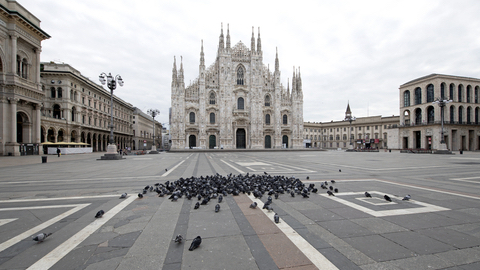
Piero Pelizzaro, Milan’s Chief Resilience Officer, recently spoke in a webinar regarding the city’s Coronavirus response effort. The effort is split into three groups: emergency management, community support for those who are uninfected but in quarantine, and a task force for ‘plan zero’ when the emergency ends. Milan is the capital of Lombardy – Italy’s worst-hit region.
Immediate measures include the closure of public spaces, remote working, lifting traffic restrictions and tolls, moving city services online, and the suspension of some taxes.
“We are now facing the first crisis, but it’s not the only one,” Pelizzaro said. “At the end of this emergency, we will have the second crisis – economic and social. We cannot wait until the end to start thinking about how we can respond to that, because that could be even bigger than what we are facing at the moment.”
Pelizzaro noted that the increase in remote working has highlighted how “all our life is based on the internet” and that there could be a shift to a more publicly owned digital infrastructure. The pandemic has also highlighted the need for mechanisms which ensure the private sector is capable and ready to switch from one type of production to another. For example, several perfume companies and breweries are now producing hand sanitizer gel – but in some cases, the shift took too long, Pelizzaro noted: “We need to stop thinking in silos.”
The lock-downs have produced a lessening of pollution levels – according to the European Space Agency, NO2 levels have fallen around 40 percent in Milan and similar drops have been observed in other shutdown cities globally. The environmental outcomes offer a sliver of “good news from this terrible situation” and may guide thinking “about what could be the future of the globe and our cities,” Pelizzaro said.
“We need to rethink our way of moving; we need to rethink the economy,” he commented. “And there is a huge opportunity to create a huge program of investment in renewable energy and energy efficiency,” which could help with recovery and meeting environmental goals.
Two questions facing us all remain: when will things be back to ‘normal’, and how we will even know that they are normal in such an unprecedented situation?
There are two levels of trust, Pelizzaro said: “The institutional trust in [addressing] the emergency and then going back to normal…and also the emotional trust. That human trust is an essential element of ‘plan zero’.”
He urged cities to start thinking now about actions which will prepare people to gather again in public spaces without being scared, when the time comes.
“We don’t have to look only at technology or health. We must look at emotional and psychological action at the same level of importance,” he commented.